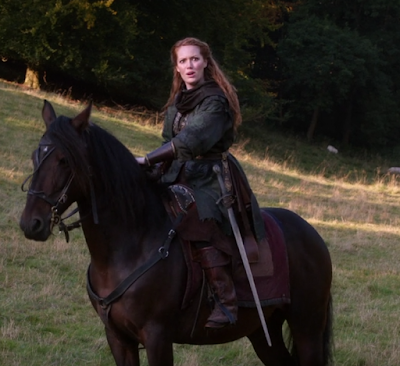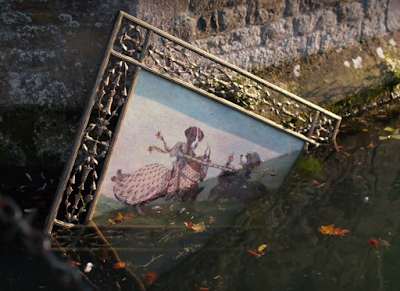Read the next entry here!
Some tensions are eased and a spell is broken as Galavant continues.
2.5, "Giants vs. Dwarves"
Written by Dan Kopelman, Luan Thomas, Julia Grob, and Joe PiarulliDirected by Declan Lowney
Synopsis
 |
| Tad is a fearsome-looking thing. Image taken from the episode, used for commentary |
Richard wanders off, singing to and about Tad. He finds himself suddenly taken captive afterwards.
Isabella continues her saccharine wedding planning under Wormwood's control. One invitation to the wedding has not been returned, and in the following discussion, Isabella's mother follows several others from previous episodes and notes the strange changes to Isabella's behavior. Wormwood exerts his influence on Isabella and has her confine her mother to the dungeon.
 |
| Confusion is understandable. Image taken from the episode, used for commentary |
Elsewhere, Sid accompanies Gareth to an impromptu market. Sid marks changes in Gareth's demeanor, and Gareth notes his burgeoning affection for Madalena. Sid is surprised at the change in attitude.
 |
| Confusion is understandable. Image taken from the episode, used for commentary |
Sid and Gareth confer about Gareth's plans to announce his love to Madalena. Sid tries to talk him out of it, but Gareth does not relent.
 |
| There's not much confusion here. Image taken from the episode, used for commentary |
The promised fight between the giants and dwarves begins amid a West Side Story-style song-and-dance number. Roberta rages against their continuing folly and purposes to stop the conflict between them. The fracas ensues with confusion among the many combatants; Roberta solves the underlying problem between the giants and dwarves and calls Galavant's and Richard's attention to their common cause and mutual need. They are reconciled, and the giants and dwarves return to work on their bridge.
Gareth and Madalena reach a nascent romantic accord, and Sid flees for his life. Isabella purposes vengeance upon Wormwood.
Discussion
There've been several references in the series to Game of Thrones. Watching the musical number in which Richard extols Tad, I cannot help but think that it is another such, riffing off of such episodes of the HBO series as "The Dance of Dragons." Given the degree to which the HBO series (inaccurately) informs popular understanding of the European medieval, I have to wonder at how the joke functions for a great many people. I am not certain it does for an overly broad cross-section of ABC's audience. It did for me, though.There've also been many points in the series that have sat uncomfortably. The present episode presents a couple of them. One is in the interchange between Jubilee and Isabella, which seems to reflect and reinforce the virgin/whore dichotomy that is unfortunately prevalent. Although it does subvert Manichean allegory to some extent, and it does result in Isabella doffing her saccharine persona (inflicted upon her by patriarchal structures, certainly), it also persists in associating female sexuality--both in a general sense and with a focus on bisexual identity, given Jubilee's announcement that she engages both male and female partners--with peril and deploys a character specifically as a sexual counterpoint to Isabella.
Roberta having to do the emotional labor of maintaining not only Galavant and Richard, but also of reconciling the giants and dwarves, is another bit that sits uncomfortably. Alixe Bovey attests that medieval women did undertake such roles, as well as many others, even as they do now, but to have the eminently capable Roberta--who is shown in the episode to have caught, killed, and carried back to camp a deer--serving as the emotional anchor of the group seems to play into stereotypes that should be opposed rather than reinscribed. How this might be done is not settled, of course; she is clearly emotionally invested in Richard (for reasons that are not entirely clear, given his continuing incompetence and history of cruelty), so leaving him to suffer the consequences of his actions would be injurious to her, but preserving him from those consequences forces her into a maternalistic role that does not bode well for her.













